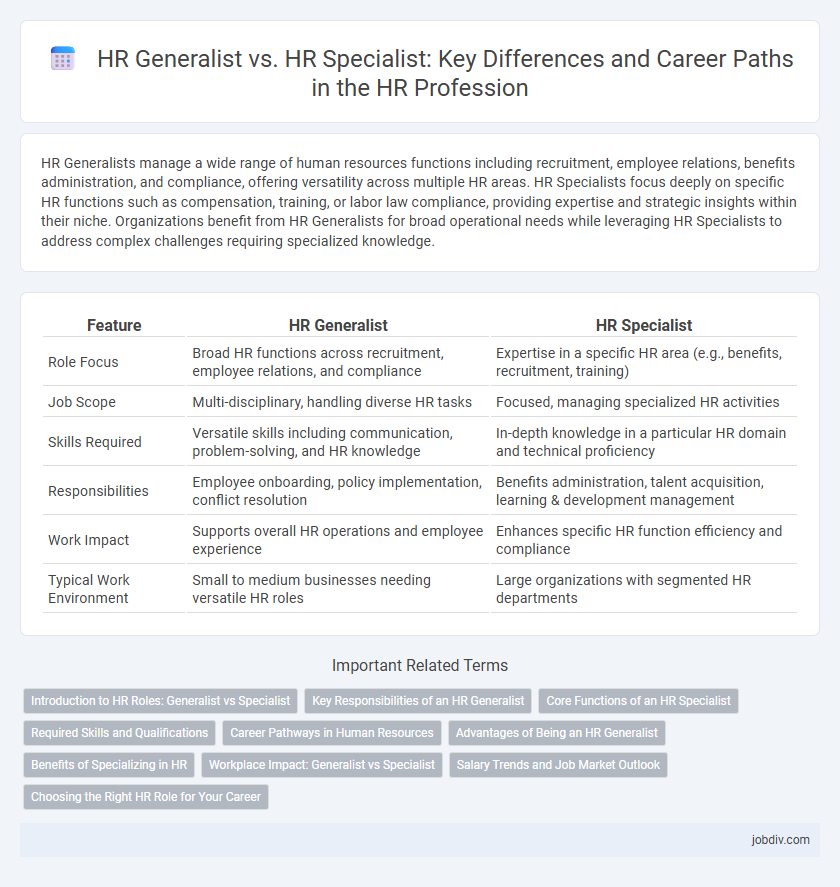HR Generalists manage a wide range of human resources functions including recruitment, employee relations, benefits administration, and compliance, offering versatility across multiple HR areas. HR Specialists focus deeply on specific HR functions such as compensation, training, or labor law compliance, providing expertise and strategic insights within their niche. Organizations benefit from HR Generalists for broad operational needs while leveraging HR Specialists to address complex challenges requiring specialized knowledge.
Table of Comparison
| Feature | HR Generalist | HR Specialist |
|---|---|---|
| Role Focus | Broad HR functions across recruitment, employee relations, and compliance | Expertise in a specific HR area (e.g., benefits, recruitment, training) |
| Job Scope | Multi-disciplinary, handling diverse HR tasks | Focused, managing specialized HR activities |
| Skills Required | Versatile skills including communication, problem-solving, and HR knowledge | In-depth knowledge in a particular HR domain and technical proficiency |
| Responsibilities | Employee onboarding, policy implementation, conflict resolution | Benefits administration, talent acquisition, learning & development management |
| Work Impact | Supports overall HR operations and employee experience | Enhances specific HR function efficiency and compliance |
| Typical Work Environment | Small to medium businesses needing versatile HR roles | Large organizations with segmented HR departments |
Introduction to HR Roles: Generalist vs Specialist
HR Generalists manage a broad range of human resources functions including recruitment, employee relations, and compliance, ensuring organizational harmony and policy adherence. HR Specialists concentrate on specific areas such as benefits administration, talent acquisition, or training, providing deep expertise and targeted solutions. Both roles are critical for effective HR management, balancing comprehensive oversight with specialized knowledge.
Key Responsibilities of an HR Generalist
An HR Generalist handles a broad range of human resource functions including recruitment, employee relations, performance management, benefits administration, and compliance with labor laws. They serve as a strategic partner, coordinating various HR activities to support organizational goals and ensure workplace efficiency. Their role contrasts with HR Specialists who focus deeply on specific areas like compensation, training, or recruitment.
Core Functions of an HR Specialist
HR Specialists focus on core functions such as talent acquisition, employee relations, benefits administration, and compliance with labor laws, offering specialized expertise in these areas. Their role involves managing detailed processes like recruitment strategies, employee training programs, and benefits coordination to enhance workforce effectiveness. This specialization allows HR Specialists to provide targeted solutions that support organizational goals and improve employee satisfaction.
Required Skills and Qualifications
HR Generalists require a broad skill set including employee relations, compliance knowledge, and performance management to handle diverse HR functions. HR Specialists possess in-depth expertise in specific areas like recruitment, benefits administration, or training development, often holding certifications such as SHRM-CP or PHR. Both roles demand strong communication, problem-solving abilities, and familiarity with HRIS software to effectively support organizational goals.
Career Pathways in Human Resources
HR Generalists gain broad experience by managing recruitment, employee relations, and compliance, creating a versatile foundation for advancement into senior HR management or business partner roles. HR Specialists develop deep expertise in specific areas such as talent acquisition, compensation and benefits, or learning and development, often leading to roles as subject matter experts or specialized consultants. Career pathways in human resources depend on whether one prefers a broad-based approach with diverse responsibilities or a focused path with specialized knowledge.
Advantages of Being an HR Generalist
HR Generalists possess a broad understanding of multiple HR functions, including recruitment, employee relations, compliance, and benefits administration, enabling them to address diverse organizational needs efficiently. Their versatility allows them to adapt quickly to changing business demands and contribute strategically across various HR domains. This holistic approach often leads to enhanced problem-solving capabilities and stronger collaboration between departments.
Benefits of Specializing in HR
Specializing in HR allows professionals to develop deep expertise in specific areas such as talent acquisition, employee relations, or compensation and benefits, leading to higher proficiency and value within organizations. HR specialists often command increased salaries and career growth opportunities due to their focused skill set, which addresses complex challenges more effectively than generalist knowledge. Employers benefit from HR specialists' advanced capabilities in optimizing workforce strategies, improving compliance, and driving organizational performance.
Workplace Impact: Generalist vs Specialist
HR Generalists provide comprehensive support across multiple HR functions including recruitment, employee relations, and compliance, enabling adaptable solutions that benefit the entire workforce. HR Specialists possess deep expertise in specific areas like compensation, benefits, or talent acquisition, driving targeted improvements and specialized initiatives that enhance organizational effectiveness. The workplace impact of Generalists lies in their versatility and holistic approach, while Specialists contribute through focused skills that address complex HR challenges with precision.
Salary Trends and Job Market Outlook
HR Generalists typically command median salaries ranging from $55,000 to $75,000 annually, reflecting their broad skill set across recruitment, employee relations, and compliance, while HR Specialists often earn between $60,000 and $80,000, leveraging deep expertise in areas such as benefits administration or talent acquisition. Job market outlook indicates growing demand for HR Specialists in niche fields, driven by increasing organizational focus on specialized talent management, whereas HR Generalists remain crucial for small to mid-sized companies requiring versatile HR support. Salary trends favor specialists in competitive industries like tech and healthcare due to their targeted skills, whereas economic fluctuations influence generalist roles more broadly across sectors.
Choosing the Right HR Role for Your Career
Selecting between an HR Generalist and an HR Specialist depends on your career goals and expertise preference; HR Generalists handle diverse responsibilities across recruitment, employee relations, and compliance, while HR Specialists concentrate deeply on specific functions like benefits administration or talent acquisition. Understanding industry demand shows that versatile HR Generalists gain broader opportunities in smaller companies, whereas Specialists often excel in larger organizations requiring targeted skills. Evaluating your desire for breadth versus depth in HR knowledge enables strategic career alignment with role-specific growth and job satisfaction.
HR Generalist vs HR Specialist Infographic

 jobdiv.com
jobdiv.com